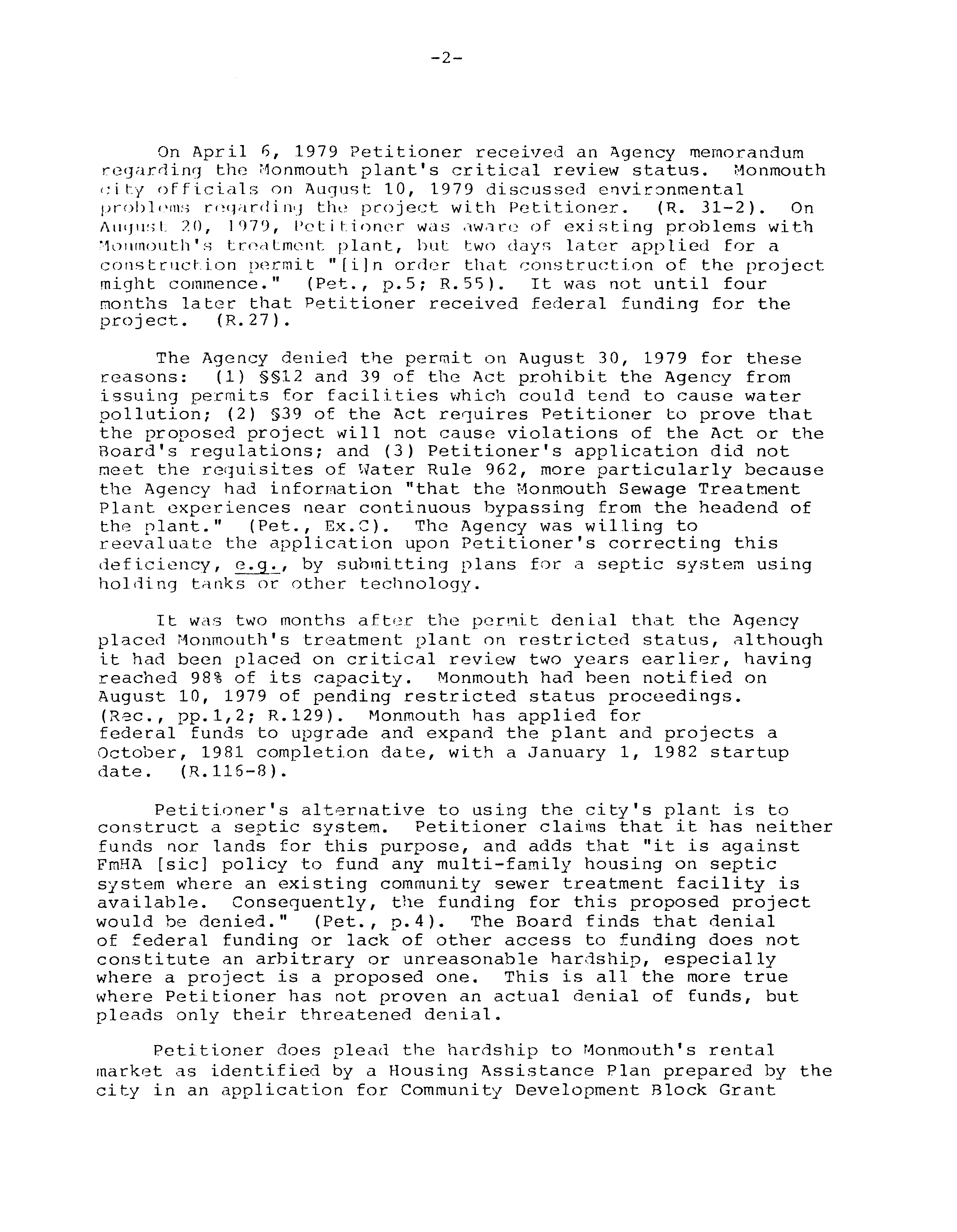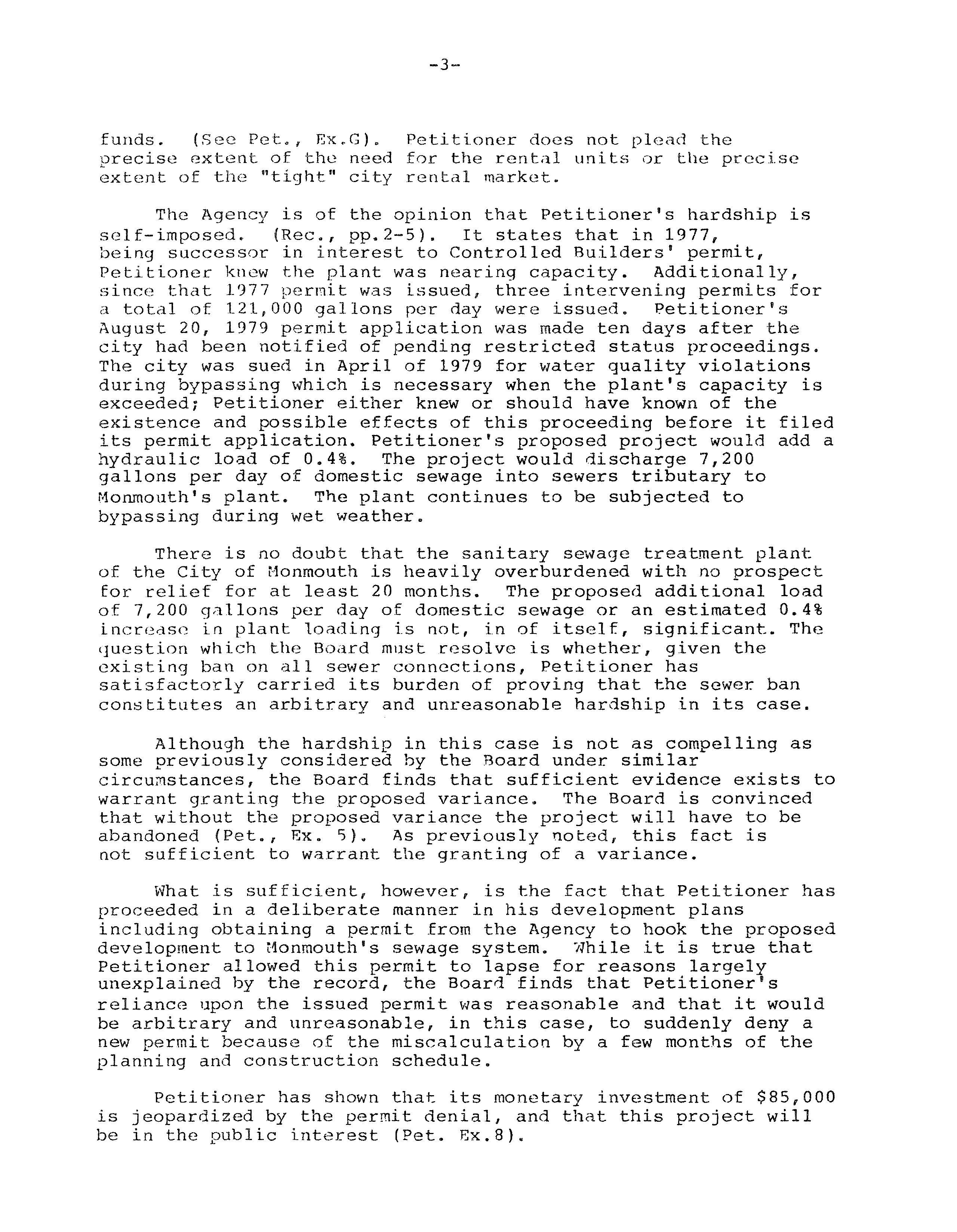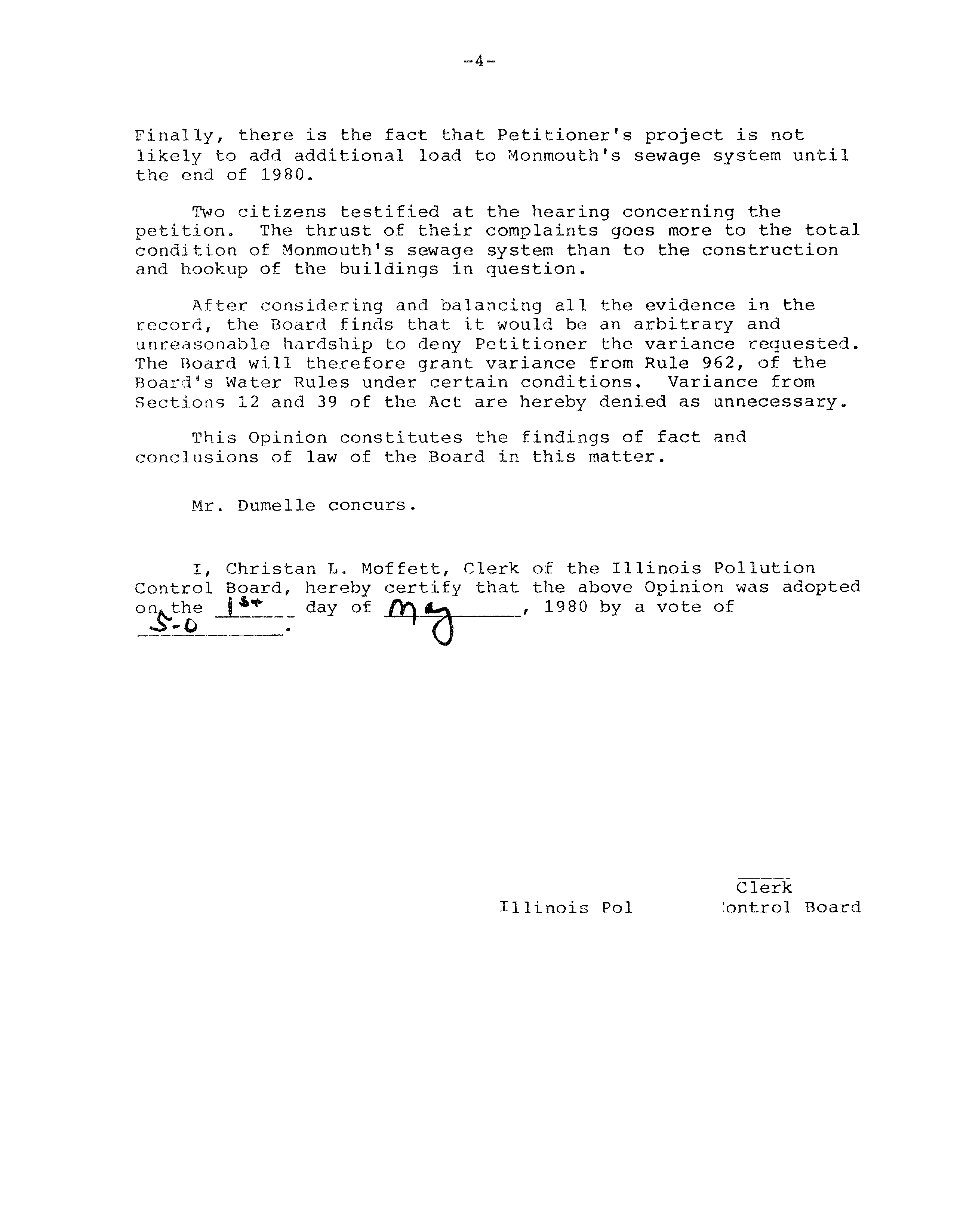ILLINOIS POLLUTION CONTROL BOARD
May
1,
1980
H.
J, BERGMAN BUILDERS, INC.,
)
a Delaware Corporation,
Petitioner
)
PCB 79—264
v.
ILLINOIS
ENVIRONMENTAL
PROTECTION
AGENCY,
)
Respondent.
TIM SWAIN, ATTORNEY AT
LAW, APPEARED ~‘ORPETITIONER;
STEPHEN
GROS SHARK,
ASSISTANT
ATTORNEY
GENERAL,
APPEARED
FOR
RESPONDENT:
OPINION
OF
THE
BOARD
(by
Board
Member
Goodman):
This
opinion
supports
the
Board
order
herein
of
April
5,
1980,
On
December
13,
1979
Petitioner
filed
a
petition
for
variance from §~12(h) and 39(a)
of the Illinois Environmental
Protection Act
(Act) and Rule 962(a)
of
the Board’s Water
Pollution Rules and Regulations
(Water Rules),
The Illinois
Environmental Protection Agency’s
(Agency) January
11, 1980
motion to file its recommendation
late
is granted.
On January
21,
1980 the Agency recommended denial
of the petition.
The objective Petitioner
seeks
is an Agency permit in order
to construct and operate a sewer extension in Warren County
to
service
a proposed 32—family
(72 occupants) moderate income
rental housing project. The sewer would connect to the sanitary
sewage treatment plant of the City of Monmouth.
Two of
Petitioner’s principals have owned an undivided
50
interest in
the site property
as beneficiaries of a land trust since June of
1977.
(R.68—9).
On June 30,
1976 a six—month building permit was issued to
Controlled Builders,
Inc.
(Pet.,
Ex.E).
On May 27,
1977 the
Agency granted Controlled Builders,
Inc.
Permit No. 1977—HB—4291
to construct the sewer extension and granted the City of
T4onmouth,
under
the
same
permit,
the
right
to
own
and
operate
the
extension.
(Pet.,
Ex.F).
It
was
not
then
constructed
due
to
federal
funding delays occasioned by Petitioner’s revisions of
the site plans and the building plans until the Summer of
1979.
(Pet., p.5; R.29).
In May of
1977 two of Petitioner’s
principals
formed. the Corporation and received assignment of
Controlled Builders’ permit.
(R,63-4).
—2—
On April
6,
1979 Petitioner received an Agency memorandum
regarding
the Monmouth plant’s critical review status.
Monmouth
city OffLCialS
on
August:
10,
1979 discussed environmental
1;r~1)I~‘nsr~qard
i nj
t:he project with Petitioner.
(R.
31—2
)
.
On
Atigu;
L
20,
1 979,
Pet:il-loner was aware
oF
cxi sting
problems
with
‘loumouth
‘
s
t:r:ea Lment plant,
but
t:wo
days
later applied
For
a
cons
t rucU.ion permit
“
ii
n
order
that
cons
truct:ion
of
the
project
might
commence.”
(Pet.,
p.5;
R.55).
It
was
not
until
four
months
later
that
Petitioner
received
federal
funding
for
the
project.
(R.27).
The
Agency
denied
the
permit
on
August
30,
1979 for these
reasons:
(1) §~i2and 39
of the Act prohibit the Agency from
issuing permits
for facilities which could
tend to cause water
pollution;
(2)
§39 of the Act requires Petitioner
to prove that
the proposed project will not cause violations of
the Act or the
Board’s
regulations; and
(3) Petitioner’s application did not
meet the requisites of Water Rule
962, more particularly because
the
Agency
had
information
“that
tho
Monrnouth
Sewage
Treatment
Plant
experiences
near
continuous bypassing
from the headend of
the
plant.”
(Pet.,
Ex.C).
The Agency was willing
to
reevaluate
the application upon Petitioner’s correcting this
deficiency,
~
by
submitting
plans
for
a
septic
system
using
hol
di. ng
tanks
or
other
technology.
It
was
two
months
after
the
permit
denial
that
the
Agency
placed
Monrnouth’
s
treatment
plant
on
restricted
status,
although
it had been placed
on
critical
review
two
years
earlier,
having
reached
98
of its capacity.
Monmouth had been notified on
August
10,
1979
o.f pending restricted status proceedings.
(Rec., pp.1,2; R.129).
Monmouth has applied
for
federal
funds
to upgrade and expand the plant and projects a
October,
1981 completion date, with a January
1,
1982 startup
date.
(R.116—8).
Petitioner’s alternative to using
the city’s plant:
is
to
construct
a septic system.
Petitioner claims that it has neither
funds
nor lands
for this purpose,
and adds that “it
is against
FmHA
sic
policy to
fund any multi-family housing on septic
system where an existing community
sewer treatment
facility is
available.
Consequently, the funding
for this proposed project
would he denied.”
(Pet., p.4).
The Board
finds that denial
of federal funding or lack of other access
to funding does not
constitute an arbitrary
or unreasonable hardship,
especially
where a project is
a proposed one.
This
is all the more true
where Petitioner has
not proven an actual denial
of
funds, but
pleads only their threatened denial.
Petitioner does plead the hardship to Monmouth’s rental
market as
identified
by
a Housing Assistance
Plan prepared by the
city in an application
for Community Development Block Grant
—3—
funds.
(See
Pet.,
Ex.C),
Petitioner
does
not
plead
the
precise
extent
of
the
need
for
the
rental
units
or
the precise
extent
of
the
“tight”
city
rental
market.
The Agency
is
of
the
opinion
that
Petitioner’s
hardship
is
self—imposed.
(Rec., pp.2—5).
It states that
in 1977,
being successor
in interest to Controlled Builders’ permit,
Petitioner know
the plant was nearing capacity.
Additionally,
since that
1977 permit was issued,
three intervening permits for
a
total
of
121,000 gallons per day were issued.
Petitioner’s
August
20,
1979
permit application was made
ten
days
after
the
city had been notified of pending restricted status proceedings.
The city was sued in April
of
1979 for water quality violations
during bypassing which
is necessary when the plant’s capacity
is
exceeded; Petitioner either knew or should have known of the
existence and possible effects
of this proceeding before
it filed
its permit application.
Petitioner’s proposed project would add a
hydraulic
load of 0.4,
The project would discharge 7,200
gallons per day of domestic sewage into sewers tributary
to
Honrnouth’s
plant.
The plant continues
to be subjected
to
bypassing during wet weather.
There
is
no
doubt
that
the
sanitary
sewage
treatment
plant
of
the
City
of
Monmouth is heavily overburdened with no prospect
for
relief
for
at
least
20
months.
The
proposed
additional
load
of
7,200 gallons per day
of
domestic
sewage
or
an
estimated
0.4
increase
in
plant
loading
i.s
not,
in
of
itself,
significant.
The
questlon
which
the
Board
must
resolve
is
whether,
given
the
existing
ban
on
all
sewer
connections,
Petitioner
has
satisfactorly carried
its burden of proving that the sewer ban
constitutes
an
arbitrary
and
unreasonable
hardship
in its case.
Although the hardship in this case is
not as compelling
as
some previously considered by the Board under similar
circumstances,
the Board finds that sufficient evidence exists
to
warrant granting the proposed variance,
The Board
is convinced
that without
the proposed variance the project will have to be
abandoned
(Pet,, Ex.
5).
As previously noted,
this fact
is
not sufficient
to warrant the granting
of a variance.
What
is sufficient,
however,
is the fact that Petitioner has
proceeded
in a deliberate manner
in his development plans
including obtaining
a permit from the Agency to hook the proposed
development to tionmouth’s sewage system.
While
it
is true that
Petitioner
allowed this permit to lapse for reasons largely
unexplained by the record,
the Board finds that Petitioner’s
reliance upon the issued permit was reasonable and that it would
be arbitrary and unreasonable,
in this case,
to suddenly deny
a
new permit because of the miscalculation by
a few months of
the
planning
and construction schedule.
Petitioner has
shown that its monetary investment of $85,000
is jeopardized by the permit denial,
and that this project will
he
in the public interest
(Pet.
Ex.8),
—4—
Finally,
there is the fact that Petitioner’s project
is not
likely
to add additional
load
to Monmouth’s sewage system until
the end of
1980.
Two
citizens testified at the hearing concerning the
petition.
The thrust of their complaints goes more to the total
condition
of
Monmouth’s
sewage
system
than
to
the
construction
and
hookup
of
the
buildings
in
question.
After considering and balancing all the evidence in the
record,
the Board
finds
that
it would be an arbitrary and
unreasoneole hardship to deny Petitioner the variance requested.
The Board will
therefore grant variance from Rule
962,
of the
Board’s Water Rules under certain conditions.
Variance from
Sections
12 and 39 of the Act are hereby denied as unnecessary.
This Opinion constitutes the findings of fact and
conclusions
of
law of the Board
in this matter.
Mr. Dumelle concurs.
I,
Christan
L. Moffett,
Clerk of
the Illinois Pollution
Control Board,
hereby certify that the above Opinion was adopted
o~the
J~
day
of
______,
1980 by a vote of
Clerk
ontrol Board
Illinois Pol





